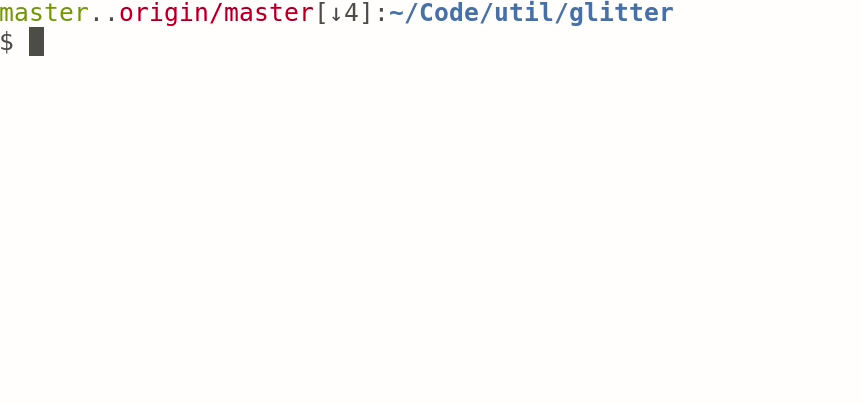| benches | ||
| img | ||
| lib | ||
| proptest-regressions | ||
| src | ||
| .appveyor.yml | ||
| .gitignore | ||
| .pre-commit.sh | ||
| .travis.yml | ||
| Cargo.lock | ||
| Cargo.toml | ||
| LICENSE | ||
| README.md | ||
✨ glitter
Git status summary with custom formats, perfect for your shell prompt
Glitter is a cross-platform command-line tool and format language for making informative git prompts. Glitter's interpreter, glit will:
- Read status information from your git repository through the git api
- Parse and Interpret the provided format
- Output your format with the requested information to
stdout
Glitter is a binary tool which affords blazing speed, offers maximum flexibility, and painless installation. This makes Glitter an ideal alternative to alternative to tools like bash-git-prompt, zsh-git-prompt, and posh-git.
Glitter has been tested on Windows, Mac, and Ubuntu; it works in Powershell, zsh, bash, and theoretically any shell environment that supports a prompt command.
Installation
Go to the release page and download a binary for your platform.
To make sure Glitter is installed:
$ glit "'hello from git'" -e "'hello'"
It will output hello from git if the current directory is in a git repository and hello if it is not.
Build from source
Install the rust toolchain, cmake and openssl first, and then:
$ cargo install glit
Setting up your shell
Once Glitter is installed, you need to set it to update your prompt.
Bash
Add the following snippet to your ~/.bashrc or just paste the snippet in your shell to try it without doing anything permanent.
# Format to use inside of git repositories or their sub-folders
export GIT_FMT="#g*(b)..#r(B)[+('↑')-('↓'), #~(#g(MARD):#r(maud)), h(#m('@'))]:#b*('\w')'\n\$ '"
# Format to use outside of git repositories
export PS1_FMT="#g(#*('\u')@'\h'):#b*('\w')'\$ '"
__set_prompt() {
PS1="$(glit "$GIT_FMT" -b -e "$PS1_FMT")"
}
export PROMPT_COMMAND=__set_prompt
Powershell
Add the following snippet to your $PROFILE or just paste the snippet in your shell to try it without doing anything permanent.
# Format to use inside of git repositories
$GIT_FMT=":#y([#c*(b) #c(B):#~(+,-) | #~(#g(MARD):#r(maud):#m(h('@')))])"
function prompt {
$path = $(get-location)
glit "'$path'$GIT_FMT'> '" -e "'$path> '"
}
zsh
Add the following snippet to your ~/.zshrc file or just paste the snippet in your shell to try it without doing anything permanent.
# Format used in a git repository
export GIT_FMT="#g*(b)..#r(B)[+('↑')-('↓'), #~(#g(MARD):#r(maud)), h(#m('@'))] #b*('%~')"
# Fallback format used outside of git repositories
export PS1_FMT="#g*('%m')#b*('%~')"
precmd() { print -rP "$(glit "$GIT_FMT" -b -e "$PS1_FMT")" }
PROMPT="%# "
fish
Replace your ~/.config/fish/functions/fish_prompt.fish file with or just paste the snippet in your shell to try it without doing anything permanent.
function fish_prompt
set -l path (prompt_pwd)
# format used in git repositories
set git "#g*(b)..#r(B)[+('↑')-('↓'), #~(#g(MARD):#r(maud)), h(#m('@'))] #y('$path')'\n> '"
# fallback format used outside of git repositories
set ps1 "#y('$path ')'> '"
echo -e (glit $git -e $ps1)
end
Customizing your format
Glitter provides a flexible expression language which is easy to use and easy to prototype with.
| Colorless Example |
|---|
 |
"b..B({+-}) [MARD] \(maud) h" |
| Compact Example |
|---|
 |
"[#c*(b)@#c(B):{+,-} | #~(#g(MARD):#r(maud):h('@'))]" |
| Friendly for git Beginners |
|---|
 |
"#g*(b)..#r(B)[#g(+(#~('ahead '))), #r(-(#~('behind '))), #~(#g(MARD)#r(maud)), h('stash ')]" |
Closely matches the information in git status -sb |
A glitter format is made of 4 types of expressions:
- Informational expressions
- Group expressions
- Strings
- Separators
- Format expressions
Git Information
| Formatter | Meaning | Example |
|---|---|---|
b |
branch name or head commit id | master |
B |
tracking branch with remote | origin/master |
+ |
# of commits ahead remote | +1 |
- |
# of commits behind remote | -1 |
m |
# of unstaged modified files | M1 |
a |
# of untracked files | ?1 |
d |
# of unstaged deleted files | D1 |
u |
# of merge conflicts | U1 |
M |
# of staged modified files | M1 |
A |
# of added files | A1 |
R |
# of renamed files | R1 |
D |
# of staged deleted files | D1 |
h |
# of stashed changes | H1 |
You can provide other expressions as arguments to expressions which replace the default prefix which appears before the result or file count. For example, \h('@') will output @3
instead of H3 if your repository has 3 stashes. You can provide an arbitrary number of valid expressions as arguments to any of these expressions.
$ glit "b"
master
$ glit "b('on branch ')"
on branch master
Expressions generally only render any output if their corresponding values aren't empty; in other words, if there are no added files, glit will not produce A0 as the output of \A, but instead will output an empty string.
Grouping
Glitter will surround grouped expressions with parentheses or brackets, and will print nothing if the group is empty.
| Macro | Result |
|---|---|
[] |
empty |
\(a) |
(?1); note the preceeding \ |
<> |
empty |
{} |
empty |
{b} |
{master} |
<+-> |
<+1-1> |
[MAR] |
[M1A3] where R is 0 |
[r\(a)] |
empty, when r, a are 0 |
$ glit "b<M>"
Strings
Any characters between single quotes are strings. Strings appear untouched in the output; for example, 'exact' outputs exact.
$ glit "'hello world'"
hello world
$ glit "'\n\w\n\u'"
\n\w\n\u
$ glit "'separate' 'words'"
separate words
Separators
Separators appear between expressions to help differentiate or group them. Supported separators are:
| Separator | Symbol |
|---|---|
| Space | |
| Bar/Pipe | | |
| At | @ |
| Underscore | _ |
| Colon | : |
| Semicolon | ; |
| Comma | , |
| Dot | . |
Any number of separators can be used between two expressions
$ glit "'hello', 'world'"
hello, world
$ glit "b@B::'git'"
master::git # there is no tracking branch (B)
master@origin/master::git # there is a tracking branch (B)
$ glit "b[+] | B"
master[+1] | origin/master # ahead 1 commit of tracking branch
master | origin/master # no difference between master and tracking
Separators will always print if any expression in the group has printed before it, and if the expression immediately after prints anything.
glit "b [..B..]" # [..B..] is a separate group
master [origin/master] # nothing prints before or after B
This can lead to unexpected behavior like the following:
$ glit "b MA"
master M1A1 # 1 staged change, 1 new file
masterA1 # no staged changes, 1 new file
The solution is to group the expressions that follow somehow:
$ glit "b [MA]"
master [A1]
$ glit "b #~(MA)" # tip: use reset style
master A1 # notice no extra output
Formatting text
Glitter expressions support ANSI terminal formatting through the following styles:
| Format | Meaning |
|---|---|
#~('...') |
reset |
#_('...') |
underline |
#i('...') |
italic text |
#*('...') |
bold text |
#r('...') |
red text |
#g('...') |
green text |
#b('...') |
blue text |
#m('...') |
magenta/purple text |
#y('...') |
yellow text |
#w('...') |
white text |
#k('...') |
bright black text |
#[01,02,03]('...') |
24 bit RGB text color |
#R('...') |
red background |
#G('...') |
green background |
#B('...') |
blue background |
#M('...') |
magenta/purple background |
#Y('...') |
yellow background |
#W('...') |
white background |
#K('...') |
bright black background |
#{01,02,03}('...') |
24 bit RGB background color |
Format styles can be combined in a single expression by just combining them:
| Format | Meaning |
|---|---|
#wK('...') |
white text, black background |
#r*('...') |
red bold text |
#g_('...') |
green underline text |
#~_*('...') |
underline bold text with the reset color |
$ glit "#r*('hello world')"
$ glit "#g*(b)"
$ glit "#[255,175,52]('orange text')"
$ glit "#G('green background')"
glit can understand and respects complicated nested styles, providing maximum flexibility.
$ glit "#g('green text with some '#*('bold')' green text')"
$ glit "#g*(b(#~('on branch ')))"


